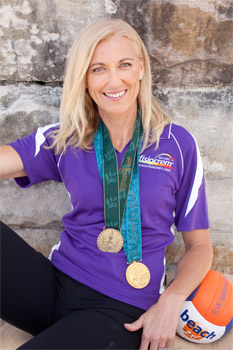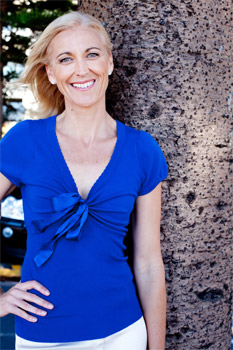Kerri Pottharst Olympic Gold Medalist and Injury Management Expert Interview

Kerri Pottharst Olympic Gold Medalist and Injury Management Expert Interview
Kerri Pottharst is one of Australia's most popular and respected female sporting personalities. She has represented the country for 22 years, having competed in three Olympic Games, winning a bronze medal in Atlanta in 1996, gold medal in the Sydney 2000 Olympics and qualifying for the Olympics in Athens in 2004.
Kerri and her partner, Natalie Cook, dominated the international volleyball scene for 10 years and were awarded Team of the Decade 1990-2000, before Kerri was inducted into the international Volleyball Hall of Fame in 2007.
Having experienced many potentially devastating injuries that threatened to end her professional sporting and coaching career, Kerri, who is currently President of the Beach Volleyball Commission, is highly cognisant of the importance of effective injury management.
While Kerri has endured no less than six knee surgeries, she also recognises that less serious injuries, including soft tissue trauma, muscle soreness, stiffness and inflammation, can cause a range of issues for everyday Australians.
'FisiocremSOLUGEL is a natural solution that I use for common aches and pains, bumps and bruises," Kerri said.
'It contains natural anti-inflammatory plant-extracts, Arnica, Hypericum, Calendula and Australian melaleuca, also known as Tea Tree oil.
'As an advocate for all things natural, I prefer to try an all-natural product, before resorting to products that contain harsh chemicals. I also try to avoid Parabens whenever possible and FisiocremSOLUGEL is free of those as well," Kerri said.
'I've been an elite athlete for more than 25 years and as I get older, I realise I need to take extra good care of myself and use only the best natural products available."
According to Kerri, it's not only athletes who experience injuries that require effective management. 'Whether it's your lower back suffering from long hours behind a desk, or sore and stiff legs after a morning beach run, FisiocremSOLUGEL provides effective relief," Kerri said.
Today, Kerri plays multiple roles as a wife, mother and mentor for other athletes. She also travels the country as a motivational speaker, addressing athletes and corporate teams, and is a renowned key note speaker.
Kerri strongly believes in taking responsibility for your own success by setting tangible goals and actively finding ways to keep yourself motivated.
'it's not what happens to you that's important. It's how you deal with it that really matters," said Kerri.
'The same applies to managing injuries. FisiocremSOLUGEL helps you manage the discomfort of everyday aches and pains, allowing you to meet the goals you've set for yourself."
Interview with Kerri Pottharst
Question: How did your creative goal-setting and effective sports injury management workshop at the Australian Physiotherapy Association (APA) Conference go?
 Question: What did participants take away from the Weekend Warrior workshop?
Question: What did participants take away from the Weekend Warrior workshop? Kerri Pottharst: The Weekend Warrior participants left with strategies designed to allow them to focus on what they want to achieve in their lives, rather than focusing on what they don't have. These strategies included items such as writing down what you want; stepping out how to achieve these goals; assigning dates to these steps and creating an inspiring environment that is full of reminders to do something each day in order to move one step closer to your dreams.
Question: What inspired you to run workshops, such as these relating to sports injury management and goal setting?
Kerri Pottharst: I am absolutely passionate about sport and so grateful that sport has taught me so many lessons about life. I love helping others, whether coaching other women in my sport or providing lessons to people from all walks of life to help them achieve their personal goals. Having encountered a major -kink' in the road on my journey after seriously injuring my knee, I choose to not only address how to try to avoid injury, but also how to treat it. That's why I'm loving being involved with FisiocremSOLUGEL, as their ambassador.
Question: Can you tell us about FisiocremSOLUGEL and why you use the product?
Kerri Pottharst: After 22 years at the top of my sport, it's only natural that I have a few aches and pains every now and again. Since retiring I also regularly get bumps, bruises or strains from doing simple things. That's why I always have Fisiocrem nearby. Because Fisiocrem is completely natural and contains no harmful chemicals, I can apply it confidently, knowing that it is going to help my aches and pains and not prove harmful to my body, like some other anti-inflammatories.
As a Mum of a 7-year-old, I am always on the look-out for anything that is natural and when I found Fisiocrem, I was in heaven.
Question: How does creative goal-setting take us to the top of our game whether we are athletes or not?
Kerri Pottharst: Ask any successful person, in sport or business, and you'll find they are all active -goal setters.' Have you heard the famous quote by Confucius, "If you aim for nothing, you're sure to hit it?" This sums it up in my mind.
If you have some fun and set creative goals (i.e. you write them down in colour, with pictures and even on something 3-dimensional), then you won't be able to use the excuse of "I forgot" or "I don't have time" or continue to say, "Oh, maybe I'll start that next year," because these goals will be front-of-mind and you won't be able to do anything but focus on them.
Question: Can you give us your top five tips for goal setting?
Kerri Pottharst: No. 1 – Take some time out in a quiet spot and decide what you'd like to achieve/have/do within the next 12 months.
No. 2 – Work out some steps, either monthly, weekly or daily, on how you're going to get there.
No. 3 – Find a picture that describes your goal.
No. 4 – Write your goal down, using colour, pictures or something 3D and put this where you can see it EVERY DAY.
No. 5 – DO something every day that drives you toward that goal.
Question: Can you talk us through what you learnt during the lows of your professional career?
Kerri Pottharst: Most definitely RESILIENCE. Being able to get back up after you've been knocked down. In my sport, not only do injuries knock you down, but you lose almost as many rallies each game as you win. So I learnt that you need to accept loss/failure/mistakes and don't dwell on them for too long. Think about how you can MAKE IT BETTER next time. That's my daily motto now – 'How can I make it better?"
Also, if you're in a funk and things are not going as planned, having those goals up around you will give you something to focus on, so you don't spend too much time dwelling on negatives.
Fill your mind with the things that you need to do to rise up again. We have around 60,000 thoughts a day – 80 per cent of them are the same. So, what are you thinking about? Are these thoughts steering you TOWARDS your goals or away from them?
Question: What are the highlights for you?
Kerri Pottharst: Obviously the Sydney 2000 Games and winning Gold. Since then, having my son and raising him with my husband is one of the biggest achievements of my life. Motherhood is SO much harder than sport.
Question: Can you talk us through a typical days training, for you?
Kerri Pottharst: When I was a full-time elite athlete, I would train for up to three hours on the sand. This involved many drills, specifically targeting areas of our games. As we got closer to competitions, we would do more game situation-type drills and play lots of games, often against men.
Then, in the afternoon, we would either go back out on the sand for another hour or so, or go into the gym to work on our strength and conditioning. Sometimes, if needed, we would have a massage, physio or chiro.
Question: What's next, for you?
Kerri Pottharst: I've been busy for many years now, since retiring in 2006, with keynote motivational speaking, workshops, appearances, charity work and media commitments. Life is awesome!
Interview by Brooke Hunter
MORE



